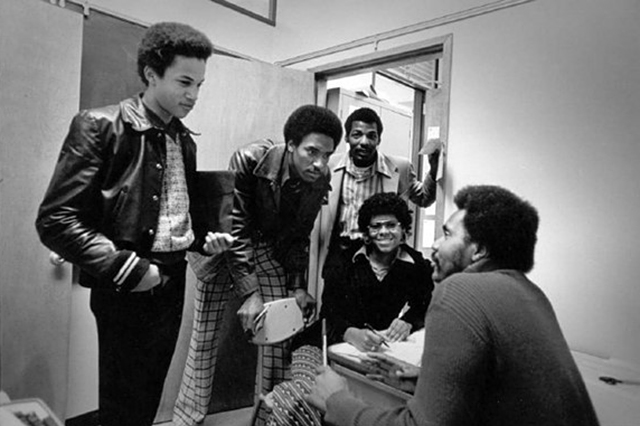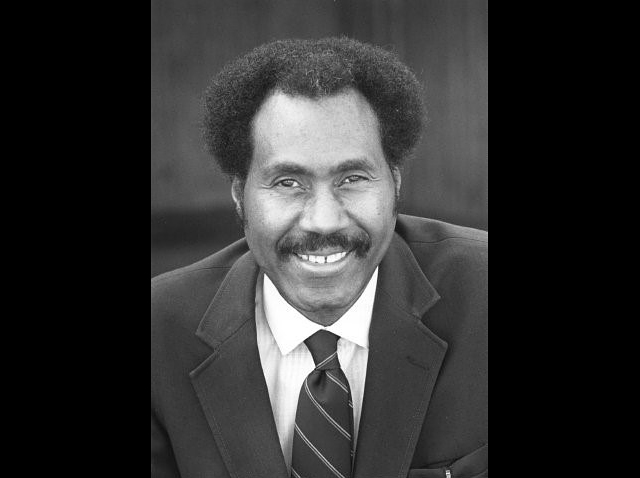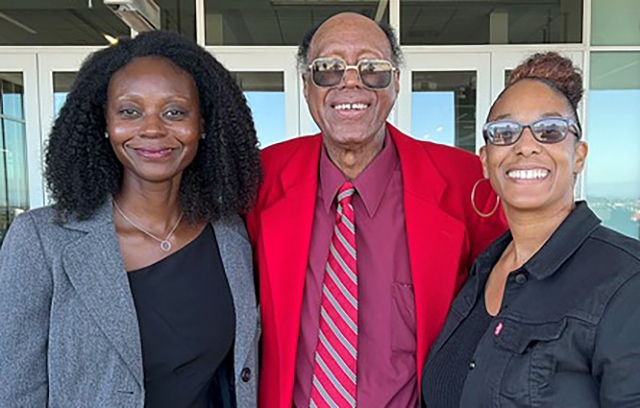Arnett Caviel
CSM counselor and professor of counseling and life skills
Former EOPS director, dean of Special Programs and Services and interim chancellor,
among many other roles
Retired after 51 years of district service
Much has changed since Arnett Caviel joined the San Mateo Community College District 51 years ago. Students get information via computers, shifting the teacher’s role from a provider of data to a guide in evaluating the data out there. Student demographics have changed, with many more Americans of color claiming their right to higher learning.
One thing hasn’t changed, according to Caviel and his College of San Mateo mentees and colleagues: If you treat students with respect and with robust expectations, they will return the favor and they will bloom.
Caviel retires in 2021 from College of San Mateo as a counselor and professor of counseling and life skills. He has held many other roles over 51 years, ranging from founding director of EOPS at Skyline College to CSM’s director of counseling, dean of Special Programs and Services, coordinator of the Disability Resource Center and, briefly, interim district chancellor. He has served on CSM’s scholarship committee for 32 years.
“It’s rare that you get to be the supervisor of one of your elders and mentors,” said Krystal Duncan, CSM’s current director of counseling, at November service awards for Arnett and other employees.
“I started here 21 years ago, and he was Mr. Arnett then.”
Skyline was just 1 year old when Arnett joined its staff in 1970 as a newly credentialed counselor. He had planned to be a cultural anthropologist when he entered graduate school at San Francisco State University, he said, but chose counseling because it seemed a better way to make a living.
“When I first got hired no one would believe I was a counselor or a professor,” Caviel said. “They’d say, ‘You look too young.’ One of the deans said, ‘Look, Arnett, the next day you come here, wear a tie.’
“Later, when I was in charge of school relations, I would visit various universities to see what kind of programs they had for orientation. People came running up to me, saying, Let me introduce you to my son or daughter—they are coming to Arizona State, or Grambling, or Tennessee State, or what have you, but I’d say, ‘I’m sorry, I am a professor at College of San Mateo...’
“When you get a little older, things change.”



Caviel reflected on how education itself has changed during his career, including more attention paid to pursuing equity.
“In a sense, it started to change even back in 1970 when they developed EOPS to help improve the academic skills of students and to assist them in being able to transfer to a university of their choice. Of course, it has improved over the years.”
“What changed everybody is the use of computers,” Caviel said. “We were able to find information so much better. We were able to access things to improve our counselees’ ability to learn and to make appropriate decisions.”
“Due to access to computers, students have a little bit of a better idea of what they might wish to be in life.”
Caviel has helped produce new generations of school counselors by supervising and advising counseling students at San Francisco State and coordinating the university’s counseling intern program.
“I had them observe my teaching and counseling at Skyline,” he said. “They’d spend almost a whole academic year observing counseling and going to workshops, and they also had a chance to practice their counseling.”
Duncan tells a story that she says conveys the essence of who Arnett is as a counselor and as a human being. One day, she received texts from staff about an irate student who had seen a number of counselors without his questions about graduation requirements being answered to his satisfaction. The student seemed volatile enough that CSM staff called Public Safety as a precaution. Caviel, however, said he would meet with the student.
“At that time I had a counselee in the office,” he remembered. “I went out there and began to talk to him, and said, ‘Look, once I finish with this counselee I want you to calm down and I will talk to you.’”
“I was able to calm him down,” Caviel said. “I was able to show him the information he needed and how he could achieve his particular goals. I did explain to him, ‘You’ve got to get your anger under control.’”
Caviel said he agonized over his decision to retire after 51 years. He looks forward to doing more traveling and to pursuing his hobby of scuba diving. As a diver, as well as a counselor, Caviel has pursued his early goals of engaging with the world’s cultures and societies—especially those situated near reefs.
“A lot of my counselees have said, ‘Since you love to scuba dive, why don’t you come to Belize? They have the world’s second-largest reef there.’ My counselees from Central America say, ‘You resemble some of the people in my country; why don’t you come to Belize, Mexico, Honduras ...?’”
“I travel all over the United States. The only state I have not been to is Alaska. Once the pandemic is over I plan to travel to Alaska.”
His parting words to colleagues:
“When I’m around you [fellow employees], I feel so much younger. For those of you who have 10, 15, 20 years of service, keep going.”
“And break my record.”

